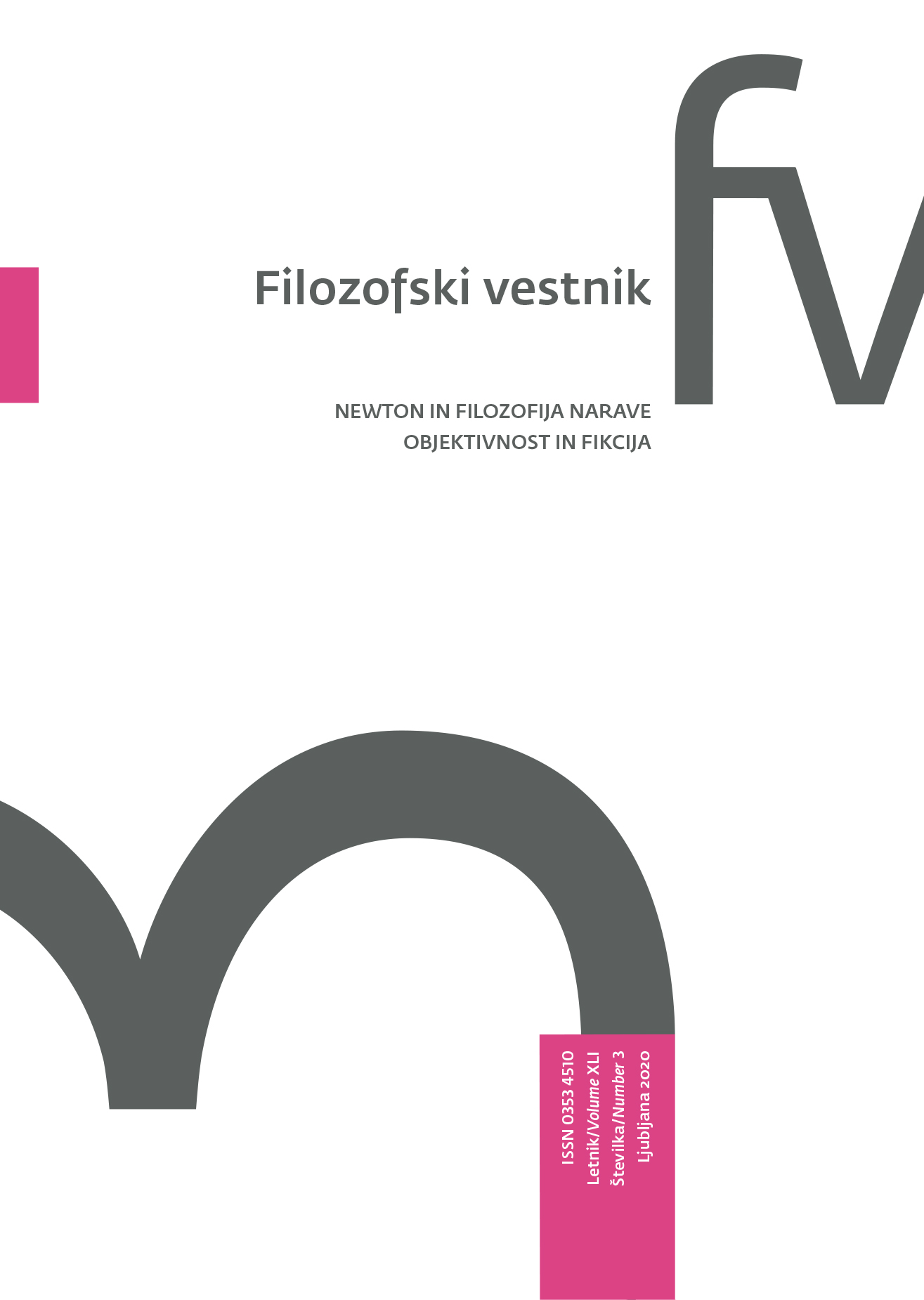Anxiety and Ontology: Toward the Lacanian Materialist Metapsychology of the Affect
DOI:
https://doi.org/10.3986/fv.41.3.05Keywords:
anxiety, ontology, psychoanalysis, Lacan, subjectivity, objectivity, jouissance, real, driveAbstract
Notwithstanding the fact that already in his early essay “The Logical Time” Lacan suggested that the “ontological form of anxiety” is the constitutive element in the process of the constitution of subjectivity, thus far there have only been rare attempts at inquiring into the relation between the affect of anxiety and Lacan’s critique of classical ontology, which this article will try to explore. Specifically, my argument will be that Lacanian anxiety, unlike, for instance, its Heideggerian variation, is inextricably connected with the third dimension of being, which amounts to what Lacan in Seminar XI labelled “the unrealized,” i.e. to the peculiar structure of the unconscious, which distorts the classical ontological opposition between being and non-being. For Lacan, the unconscious, rather than referring simply to repressed unconscious content, is instead structured around a “pre-ontological” gap (Lacan) or “ontological negativity” (Zupančič). While anxiety notoriously “does not deceive,” it does not deceive only regarding the subject’s encounter with the real, but also – and most importantly – regarding the specific ontological structure of the unconscious, which includes the negativity as its own “material cause”. In this respect, anxiety might be regarded as an “ontological” or even objective material affect – yet not in a posthumanist sense of the affect of being/matter, but rather as the affective correlate or material signal for the fracture of being itself. In short, without this specific ontological gap/negativity, there would only be fear and frustration, not anxiety, which brings anxiety into the domain of metapsychology.
Downloads
References
Copjec, Joan, “May ’68, The Emotional Month”, in Lacan: The Silent Partners, ed. Slavoj
Žižek, Verso, London 2006
Depelsenaire, Yves, Une analyse avec Dieu: Le rendez-vous de Lacan et de Kierkegaard, La
Lettre volée, Brussels 2004
Freud, Sigmund, “Repression”, in The Standard Edition of the Complete Psychological
Works of Sigmund Freud, Vol. XIV, ed. and trans. James Strachey, Vintage, London
— “Inhibition, Symptom, and Anxiety”, in The Standard Edition of the Complete
Psychological Works of Sigmund Freud, Vol. XX, ed. and trans. James Strachey,
Vintage, London 2001
Harari, Roberto, Lacan’s Seminar on Anxiety: An Introduction, trans. Jane C. Lamb-Ruiz,
The Other Press, New York 2001
Heidegger, Martin, “What Is Metaphysics?”, in Pathmarks, ed. William McNeill,
Cambridge University Press, Cambridge 1998
Johnston, Adrian, “From Signifiers to Jouis-Sens: Lacan’s Senti-Ments and Affectuations”,
in Adrian Johnston and Catherine Malabou, Self and Emotional Life: Philosophy,
Psychoanalysis, and Neuroscience, Columbia University Press, New York 2013
Johnston, Adrian and Catherine Malabou, Self and Emotional Life: Philosophy, Psychoanalysis
and Neuroscience, Columbia University Press, New York 2013
Jöttkandt, Sigi, First Love: A Phenomenology of the One, Re.Press, Melbourne, 2010
Kierkegaard, Søren, “Sickness Unto Death”, in Fear and Trembling and Sickness Unto
Death, trans. and with notes Walter Lawrie, Princeton University Press, Princeton
— The Concept of Anxiety: A Simple Psychologically Orienting Deliberation on the
Dogmatic Issue of Hereditary Sin, Kierkegaard’s Writing VIII, ed. and trans. Riedar
Thomte, Princeton University Press, Princeton 1980
Klepec, Peter, Matrice podrejanja: Kapitalizem in perverzija 2, Društvo za teoretsko psihoanalizo,
Ljubljana 2019
Lacan, Jacques, “The-Names-of-the-Father”, trans. Jeffrey Mehlman, October 40 (Spring
, pp. 81–95
— The Seminar of Jacques Lacan, Book VII: The Ethics of Psychoanalysis, trans. Dennis
Porter, W. W. Norton & Co., London and New York 1992
— The Seminar of Jacques Lacan, Book XI: The Four Fundamental Concepts of
Psychoanalysis, trans. Alan Sheridan, W. W. Norton & Co., London and New York 1998
— The Seminar of Jacques Lacan, Book XVII: The Other Side of Psychoanalysis, trans.
Russell Grigg, W. W. Norton & Co., London and New York 2006
— “The Mirror Stage as Formative of the I Function as Revealed in Psychoanalytic
Experience”, in Écrits: The First Complete Edition in English, trans. Bruce Fink, W. W.
Norton & Co., London and New York 2006
— “Logical Time and the Assertion of Anticipated Certainty: A New Sophism”, in Écrits
— “The Subversion of the Subject and the Dialectic of Desire in the Freudian
Unconscious”, in Écrits
— “Science and Truth”, in Écrits
— The Seminar of Jacques Lacan, Book X: Anxiety, trans. A. R. Price, Polity Pres,
Cambridge and Malden 2014
— Lacan, Jacques, The Seminar of Jacques Lacan, Book XX: Encore, W. W. Norton & Co.,
London and New York 1998
Miller, Jacques-Alain, “On Perversion”, in Reading Seminars I and II: Lacan’s Return to
Freud, ed. Richard Feldstein, Bruce Fink and Jannus, State University of New York
Press, New York 1996
— “Paradigms of Jouissance”, trans. Juan Jauregi, Lacanian Ink 17 (2000)
— “Introduction to Reading: Jacques Lacan’s Seminar on Anxiety”, trans. Barbara P.
Fulks, Lacanian Ink 26 (2005)
Nedoh, Boštjan, Ontology and Perversion: Deleuze, Agamben, Lacan, Rowman and
Littlefield International, London and New York 2019
O’Neill Burns, Michael, Kierkegaard and the Matter of Philosophy: A Fractured Dialectics,
Rowman and Littlefield International, London and New York 2015
Ronen, Ruth, Aesthetics of Anxiety, State University of New York Press, New York 2009
Tomšič, Samo, The Capitalist Unconscious: Marx and Lacan, Verso, London 2015
Wolf, Bogdan, Anxiety between Desire and the Body, Routledge, London 2019
Zupančič, Alenka, “On Repetition”, Sats – Northern European Journal of Philosophy 8
(1/2007), pp. 27–41
— What Is Sex?, MIT Press, Cambridge 2017
Slavoj Žižek, “Against the Politics of Jouissance”, available at: https://www.lacan.com/
zizliberal.htm (retrieved: September 16, 2019)
Downloads
Published
How to Cite
Issue
Section
License
Authors guarantee that the work is their own original creation and does not infringe any statutory or common-law copyright or any proprietary right of any third party. In case of claims by third parties, authors commit their self to defend the interests of the publisher, and shall cover any potential costs.
More in: Submission chapter





